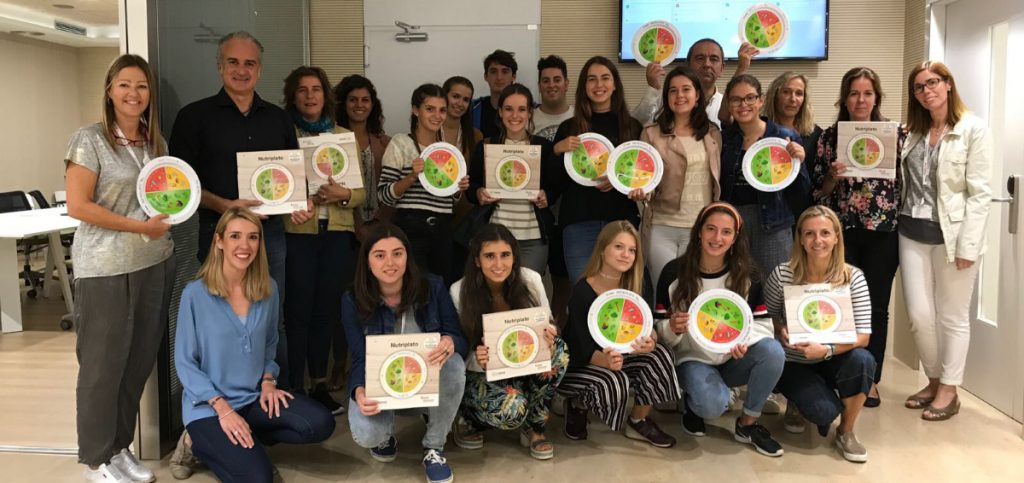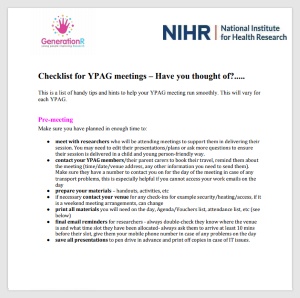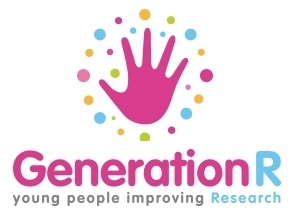- Preparation is key
- Communicating with young people, families, and researchers takes time
- Flexibility is key - always have a back up plan!
Key points

Before your meeting
Before you start the first meeting make sure members feel properly informed before they agree to take part, and what is expected of them during the meeting. This could include being clear on:
| The purpose of the meeting(s) and what you will need or expect from the young people attending | For example, how long the meeting will last and how many meetings will take place during the year |
| Who will be at the meeting(s)? | This may vary from each meeting with different researchers and visitors |
| Where meeting(s) will be held | It is important to give the location and times with possible drop off points for parents |
| What will happen at the meeting(s)? | Some young people might need assistance with transport to get to the meeting venue. Parking information for parents and carers could also be useful |
| How would members like to participate in the meeting(s)? | Most young people will want to attend in person, regularly. For others, they may need to contribute online or only attend meetings when they can. |
Have you thought of ?…..
Checklist for YPAG meetings
This is a list of handy tips and hints created by the GOSH YPAG to help your YPAG meeting run smoothly. This will vary for each YPAG depending on timetables, venues, and set up.
Pre-meeting
Make sure you have planned in enough time to:
- meet with researchers who will be attending meetings to support them in delivering their session. You may need to edit their presentations/plans or ask more questions to ensure their session is delivered in a child and young person friendly way
- contact your YPAG members/their parent or carers to book their travel, remind them about the meeting- time/date/venue address, any other information you need to send them – make sure they have a number to contact you on for the day of the meeting in case of any transport problems, this is especially helpful if you cannot access your work emails on the day
- prepare your materials – handouts, activities, etc
- if necessary contact your venue for any check-ins regarding security/heating/access, if it is a weekend meeting arrangements, can change. Check what IT facilities are available and how you can any accessibility issues, this should be done before the day to iron out any possible problems
- print all materials you will need on the day, Agenda/Vouchers list, attendance list, etc
- final email reminders for researchers – always double-check they know where the venue is and what time slot they have been allocated – always ask them to arrive at least 10 mins before their slot, give them your mobile phone number in case of any problems on the day
- save all presentations to pen drive in advance and print off copies in case of IT issues
On the day
It is good practice to establish a set of Shared Agreements to help your YPAG run smoothly. Here, eyeYPAG talk about their experiences of creating these agreements together.
EyeYPAG Shared Agreements from NIHR Moorfields BRC on Vimeo. Scroll down for links to eyeYPAG templates to help you get started.
Materials/information:
- An attendance list with names printed and space for the children and young people to sign in (good for them to take ownership of their meeting). This also doubles up as a list in case the building needs to be evacuated for a fire drill or if fire alarm sounds
- Copies of the agenda for the meeting
- If you are giving vouchers (ie not online vouchers) – a list of YPAG members attending – the group sign against their name and the voucher code.
-
Group Rules and Shared Agreements – on flip chart paper or in a “Housekeeping slide” to show at the beginning of the meeting. Depending on the group you don’t always refer to these but if there is a big group or depending on who attending you might need to remind them.
- Printed materials: Group activities, Patient Information Sheets for review, Researcher presentations in case of IT issues
- List of lunch preferences/dietary/medical needs /any extra info you need to give individual members (you forget easily when you are busy and running around so it’s good to have it to remind you – for example a photo consent form for a new member.
Members of eyeYPAG talk about their experiences of creating shared agreements to govern
Phone numbers:
- List of names/phone numbers of YPAG members attending and of their parents/carers – in case a member gets sick /needs picking up and the YPAG member hasn’t got their phone with them or ensure they are stored on your mobile (always use confidential waste bins/shred these details post-meeting)
- If a young person has started to travel to their meetings alone it is good to ask them to text their parent/carer to say they have arrived and for the YPAG lead to text their parent/carer as they leave and ask them to text when the young person has got home
- If a young person is using a taxi service/patient transport have these details printed
- Phone numbers of researchers attending – always give them yours too
- Phone number for main reception at venue/security/staff who are supporting the group with you.
Other:
- Box of pens/A4 paper/clipboards (if the group like to take notes)
- Blu tack/felt tips/pencils/post-it notes etc
- First Aid kit
- Notepad
Housekeeping on the day:
- Revisit your YPAG rules
- Remind the group that they can take comfort breaks as they need to –tell them where toilets are
- Introduce new staff who are helping support the group
- Run over the agenda – when are the breaks!
- Update the group on past researcher updates – share good news on funding applications and examples of impact.
Briefing:
- Important to brief those who are helping support the group – send them the agenda/break out groups plan in advance/ researcher presentations. If you cannot do a pre-meeting try and do it on the day before the meeting starts.
Things to remember:
- Room set up can take time depending on whether other groups use your meeting room or how you want your session to run
- Allow time to set up IT make sure videos are running smoothly
Post-meeting:
- Update your systems – attendance/feedback/vouchers/expenses
- Follow up with researchers – immediate feedback/thank you and reminder that you will be asking them to complete the Impact questionnaire
- Follow up with YPAG – you may want to send them the presentations and agenda and thank you letter!


